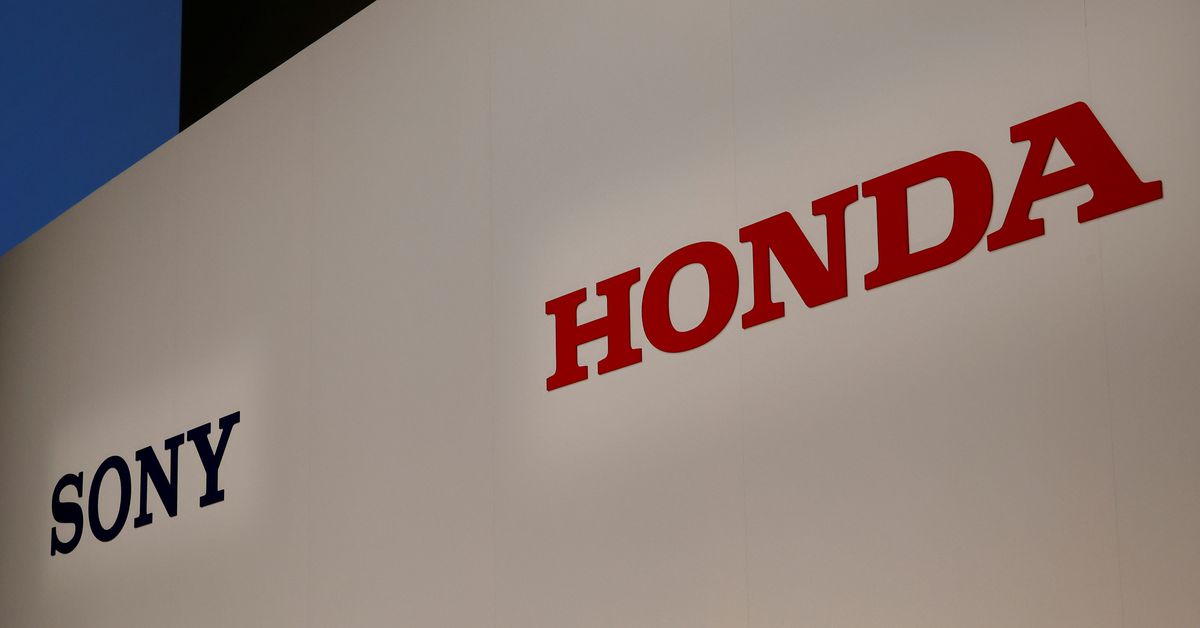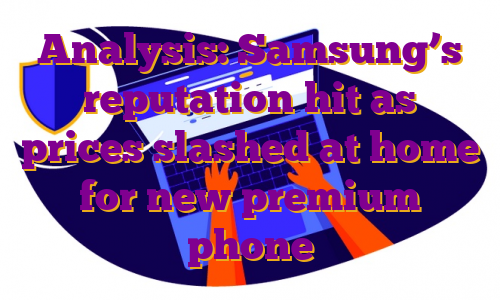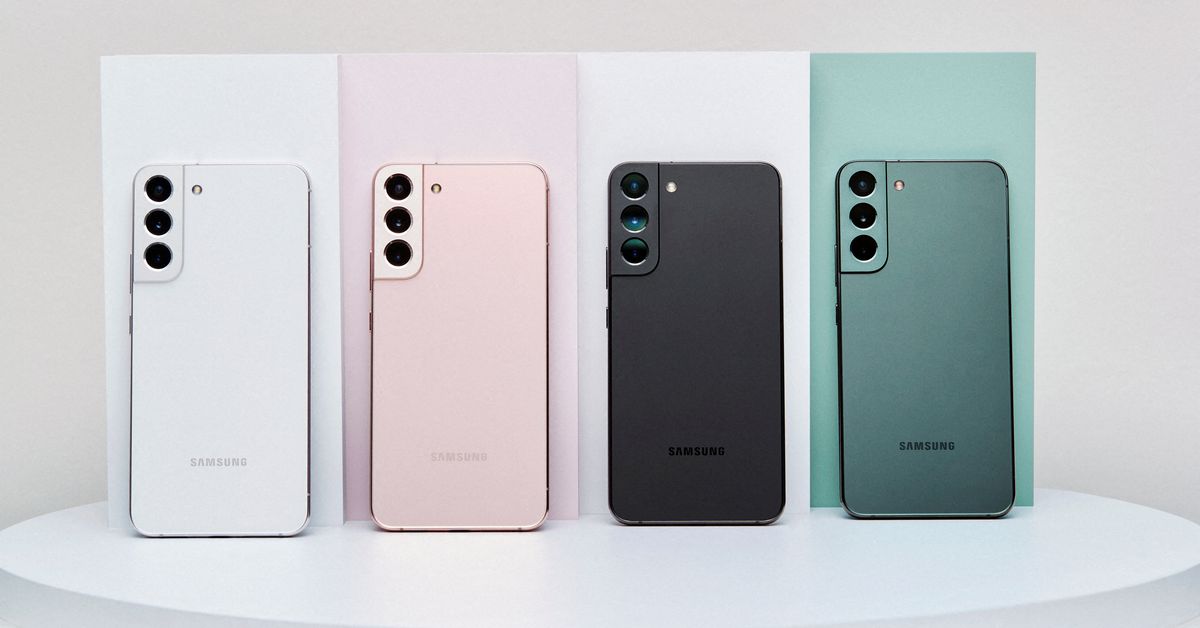TOKYO, Oct 13 (Reuters) – A joint venture set up by Japan’s Sony Group Corp (6758.T) and Honda Motor (7267.T) is aiming to deliver its first electric vehicles by 2026 and will sell them online, starting in the United States and Japan.The new EV will also be priced at a premium, offering a new software system developed by Sony that would open the way to recurring revenue from entertainment and other services that would be billed monthly, the companies said.The update from the joint venture, Sony Honda Mobility, is the first since the two companies launched the project in June.Register now for FREE unlimited access to Reuters.comKey details, including pricing, battery range and even the platform for the new vehicle have not been determined, but representatives of the new company detailed a vision for a vehicle that would function almost like a rolling smartphone.Sony will provide the software system for the new car, from the onboard controllers to cloud-based services that will connect with entertainment and payment systems.It will also provide sensors and other technology for a Level 3 autonomous drive system that will allow for drivers to pay more attention to the content and software services that will be offered.In Level 3 systems, also known as limited self-driving automation, drivers can ride without watching the road or handling the wheel on highway driving but need to be ready to take back control.Tesla (TSLA.O), General Motors(GM.N), Ford Motor Co (F.N) and Mercedes Benz(MBGn.DE) all offer some form of hands-free driving assist systems.“As safe driving technology will continue to evolve and the amount of concentration required to drive will be reduced, we should consider new ways to enjoy and spend time in the cabin space as a whole,” said Izumi Kawanishi, the joint venture’s president and executive at Sony.Honda will decide on the platform that the new vehicle will use and details like the battery supplier. The still-to-be named EV will likely be manufactured by Honda at one of its plants in Ohio.Honda, like its bigger rival Toyota Motor (7203.T), has been slow to shift its fleet to electric. It has also struggled over the years to make gains in the luxury vehicle market with its Acura brand.Yasuhide Mizuno, the joint venture’s chairman and chief executive, and a senior Honda executive, said the project was important for Honda to develop a “longer-term relationship” with its car buyers as the vehicle shifts to become more of a connected device.Mizuno said Honda believed that 2025 would be a crucial year in the shift toward EVs in the U.S. market and that the joint-venture believed it had to hit that opening even though it means a compressed development cycle for the new EV.The new EV will be delivered to the Japanese market in the second half of 2026. The two companies are considering a launch for Europe, but no plan has been set. Orders for the new EV should open in 2025, the companies said.($1 = 146.8300 yen)Register now for FREE unlimited access to Reuters.comReporting by Satoshi Sugiyama; Editing by Ana Nicolaci da CostaOur Standards: The Thomson Reuters Trust Principles. .
WhatsApp to launch cloud-based tools, premium features for businesses
A 3D-printed Whatsapp logo is placed on the keyboard in this illustration taken April 12, 2020. REUTERS/Dado Ruvic/Illustration/File PhotoRegister now for FREE unlimited access to Reuters.comMay 19 (Reuters) – WhatsApp is introducing free cloud-based API services in a push to get more businesses using the app, Meta Platforms (FB.O) CEO Mark Zuckerberg announced at the company’s messaging event on Thursday.The messaging service, which has increasingly courted business users, is one of several platforms where Facebook-owner Meta has launched more shopping and business-focused features.Zuckerberg, speaking at Meta’s “Conversations” event, said the offering would mean “any business or developer can easily access our service, build directly on top of WhatsApp to customize their experience and speed up their response time to customers by using our secure WhatsApp Cloud API hosted by Meta.”Register now for FREE unlimited access to Reuters.comWhatsApp already has an API, or type of software interface, for businesses to connect their systems and engage in customer service chats on the service, which generates revenue for Meta.Meta, which bought WhatsApp for $19 billion in a landmark 2014 deal, said that businesses would not be able to message people on WhatsApp unless they have requested to be contacted.WhatsApp also said on Thursday it was planning to provide optional paid features as part of a new premium service for users of its specialized business app, which is geared at small businesses.Those features, which are still being developed, will include options to manage chats across up to 10 devices and customized click-to-chat links that businesses can post on their websites and share with customers.Uber (UBER.N) CEO Dara Khosrowshahi, speaking in a session with Meta Chief Operating Officer Sheryl Sandberg at the conference, said a third of the users ordering rides via WhatsApp in India are new customers.The ride-hailing company, which launched its WhatsApp chatbot in December, is now planning to further customize the service starting for users in and around Delhi and expanding to markets like Brazil, he said. read more Register now for FREE unlimited access to Reuters.comReporting by Elizabeth Culliford in New York and Katie Paul; Editing by Lisa ShumakerOur Standards: The Thomson Reuters Trust Principles. .
In it for the long haul: Qantas bets on non-stop Sydney-London flights with Airbus order
- Orders 12 Airbus ultra-long haul A350-1000 planes
- Commercial direct Sydney-London flight to start late in 2025
- 20-hour trip to be world’s longest non-stop flight
- Orders 20 A321XLRs and 20 A220s to renew domestic fleet
- Overall Airbus deal could be worth more than $4 bln – Barrenjoey
SYDNEY, May 2 (Reuters) – Qantas Airways (QAN.AX) will fly non-stop from Sydney to London after ordering a dozen special Airbus (AIR.PA) jets, charging higher fares in a multi-billion dollar bet that fliers will pay a premium to save four hours on the popular route.To be launched late in 2025, the flights will use A350-1000 planes, specially configured with extra premium seating and reduced overall capacity, to ferry up to 238 passengers in a 20-hour trip – the world’s longest direct commercial flight.Announcing plans for the service on Monday, the loss-making carrier said a strong recovery in the domestic market and signs of an improvement in international flying after the worst of the COVID-19 pandemic had given it the confidence to make a major investment on its future. Qantas forecasts a return to profit in the financial year starting this July.Register now for FREE unlimited access to Reuters.comThe order from the European aircraft maker also includes 40 narrowbody A321XLR and A220 jets to start the replacement of Qantas’ ageing domestic fleet, with deliveries spread over a decade. The airline did not disclose the value of the Airbus deal, but analysts at Barrenjoey estimated in a client note it would cost at least A$6 billion ($4.23 billion).”Since the start of the calendar year, we have seen huge increases in demand,” Qantas Chief Executive Alan Joyce told reporters at Sydney Airport, where an Airbus A350-1000 test plane flown from France emblazoned with the Qantas logo and “Our Spirit flies further” was parked in a hangar as a backdrop for the announcement.Qantas shares surged as much as 5.5% on Monday to the highest level since November after it also said debt levels had fallen to pre-COVID levels faster than the market’s expectations.The A350-1000 order was the culmination of a challenge called “Project Sunrise” set for Airbus and its rival Boeing Co (BA.N) in 2017 to create aircraft capable of the record-breaking flights.Airbus was selected as the preferred supplier in late 2019, but Qantas delayed placing an order for two years due to financial challenges during the COVID pandemic.Airbus Chief Commercial Officer Christian Scherer said the aircraft to be used on the Sydney-London flights would offer more fuel storage than A350-1000s currently in operation with other airlines.The Qantas planes will carry passengers across four classes and will have around 100 fewer seats than rivals British Airways (ICAG.L) and Cathay Pacific Airways Ltd (0293.HK) use on their A350-1000s. The Australian carrier will dedicate more than 40% of the jets’ cabins to premium seating.CEO Joyce said demand for non-stop flights had grown since the pandemic, when complex travel rules were put in place. Rising fuel costs could be recovered through higher fares, he said, as the airline had done previously on its non-stop Perth-London flights.In a market update, Qantas said while it expects an underlying operating loss for the financial year ending June 30, 2022, the second half would benefit from improved domestic and international demand, with free cash flow seen rising further in the current quarter.Barrenjoey analysts forecast Qantas could achieve a 20% revenue premium on the ultra-long haul flights, which Joyce said will also go to New York from late 2025 and possible future destinations like Paris, Chicago and Rio de Janeiro.Qantas estimated Project Sunrise would have an internal rate of return of around 15%.($1 = 1.4180 Australian dollars)Register now for FREE unlimited access to Reuters.comReporting by Jamie Freed; Additional reporting by Sameer Manekar in Bengaluru; Editing by Diane Craft, Sam Holmes and Kenneth MaxwellOur Standards: The Thomson Reuters Trust Principles. .
Analysis: Samsung’s reputation hit as prices slashed at home for new premium phone
SEOUL, April 8 (Reuters) – Samsung Electronics’ (005930.KS) flagship Galaxy S22 smartphone has taken a battering from reports of hobbled performance and has seen its price halved at home in South Korea just weeks since its launch, hurting its image as an iPhone rival.Consumers have complained – and even filed a class-action lawsuit – about the handset maker advertising what it called its most powerful smartphone yet with scant detail about performance management software that they say drastically slows the premium device when using processor-intensive applications.Such are the complaints that the Korea Fair Trade Commission last month began investigating the world’s biggest phone vendor.Register now for FREE unlimited access to Reuters.comThe controversy represents a blow to Samsung’s reputation for high-end handsets – and potentially its finances – as it tries to make up for two years of premium sales that missed analyst estimates and reverse a decline in market share.”The dispute will inevitably be a big hit to Samsung’s credibility,” said analyst Lee Seung-woo at Eugene Investment & Securities.At the heart of complaints is Samsung’s Game Optimising Service (GOS) which manages device performance during gaming to prevent overheating and preserve battery life. The manufacturer introduced the software in 2016, just months before it pulled its premium Galaxy Note 7 following a series of battery fires.GOS automatically limits handset performance during gaming but also during use of other performance-intense applications, said Geekbench, a widely used performance scorer, which found the software slowed the S22’s processor by as much as 46%.The extent to which GOS slows the S22, lack of details about the software in marketing materials, and the inability to disable it set social media alight.”This is an unprecedented, crazy issue that can’t be excused in any way,” ITSub, a YouTuber with 2.1 million subscribers who specialises in gadgets, said in a YouTube post.Samsung said it issued an update to allow users to disable the software with no risk to safety. It also said it would continue to invest to innovate in both hardware and software.PRICE DROPThe S22 series hit sales of 1 million handsets in South Korea within six weeks of release, reaching the mark two weeks faster than its predecessor, Samsung said.”The intentional performance downgrade surely had a negative effect, but its actual impact on Samsung’s sales seems limited. Data shows that sales are not much affected,” said analyst Kim Ji-san at Kiwoom Securities.Still, South Korea’s three major telecom providers have nearly doubled subsidies for the S22, pushing its price as low as 549,000 won ($451) from a launch of 999,000 won. Apple Inc’s (AAPL.O) iPhone 13, released in October, starts at 1,090,000 won with carriers offering smaller subsidies of around 150,000 won.”When subsidies go up simultaneously at all three telcos, it’s typically the manufacturer making up the contributions,” said an official at carrier LG Uplus Corp (032640.KS), declining to be identified due to the sensitivity of the matter.Samsung’s 2021 market share in devices over $400 shrank 3 percentage points to 17% from a year prior, while Apple’s rose 5 percentage points to 60%, showed data from market researcher Counterpoint. The data also showed sales of both the S20 and S21 fell short of the S series’ first-year norm of 30 million units.Early shipments of the S22, launched late February, indicate Samsung will move over 6 million handsets by March-end, broadly in line with expectations, said Counterpoint Associate Director Sujeong Lim.Still, Lee at Eugene Investment & Securities, expects the GOS furore to combine with increased component costs to leave April-June operating profit at Samsung’s mobile arm at 3 trillion won, down from a previous forecast of 3.4 trillion won.IBK Investment & Securities analyst Kim Un-ho also downgraded his forecast to 3 trillion won from 3.5 trillion won.Samsung on Thursday said it expects to report an estimated 50% jump in overall January-March operating profit on April 28, as demand for its memory chips remained solid. read more SPEED LIMITTeardowns of the lowest-priced S22 showed the handset lacked a cooling component called a vapour chamber, implying increased reliance on software to manage overheating, reviewers said.Analysts said the lean toward software solutions stems from a renewed policy to cut costs – a strategy they said erodes a reputation as an innovator based on hardware strength.Lee said Samsung “is putting too much emphasis on cutting costs, which led to this unfortunate case.”One consequence of the switch is a class-action lawsuit from 1,885 consumers arguing Samsung’s marketing inflates the S22’s performance.”If Porsche has a speed limit of 100 kilometres (62 miles)per hour, would you still buy it?” said Kim Hoon-chan, the lawyer representing the consumers, adding that some 1,500 people have joined to file a second class-action suit.($1 = 1,218.4000 won)Register now for FREE unlimited access to Reuters.comReporting by Byungwook Kim; Additional reporting by Joyce Lee; Editing by Miyoung Kim and Christopher CushingOur Standards: The Thomson Reuters Trust Principles. .
GM gears up to launch ‘halo’, a new premium import business in China
The new GM logo is seen on the facade of the General Motors headquarters in Detroit, Michigan, U.S., March 16, 2021. REUTERS/Rebecca CookRegister now for FREE unlimited access to Reuters.comBEIJING, March 8 (Reuters) – General Motors Co (GM.N) plans to create a new, independently owned premium brand in China that will market what the automaker’s China chief Julian Blissett recently described as “halo cars” brought in from the United States.GM (GM.N) plans to build this new “premium import business” from the ground up and operate it with “a high level of autonomy,” GM said in a statement on Tuesday.“We are inviting talent from across the industry to join us and jointly create our brand-new business in China,” it said.Register now for FREE unlimited access to Reuters.comThe U.S. automaker issued the statement after multiple Chinese media outlets reported this week about the new wholly owned brand.According to a Shanghai-based GM spokesperson, Blissett told Chinese media outlets on Friday the new premium brand will specialize in selling upscale GM vehicles currently unavailable in China through its existing brands. Those brands include Wuling, Baojun, Chevrolet, Buick and Cadillac, all of which are owned and operated with Chinese joint-venture partners.Blissett told Chinese media outlets the new business will be fully owned by GM, the spokesperson said.Additional details such as which vehicle models the new brand plans to sell or how such models are going to be marketed and distributed will be announced at a later date, she said.Register now for FREE unlimited access to Reuters.comReporting By Norihiko Shirouzu in Beijing; Editing by Bernadette BaumOur Standards: The Thomson Reuters Trust Principles. .









